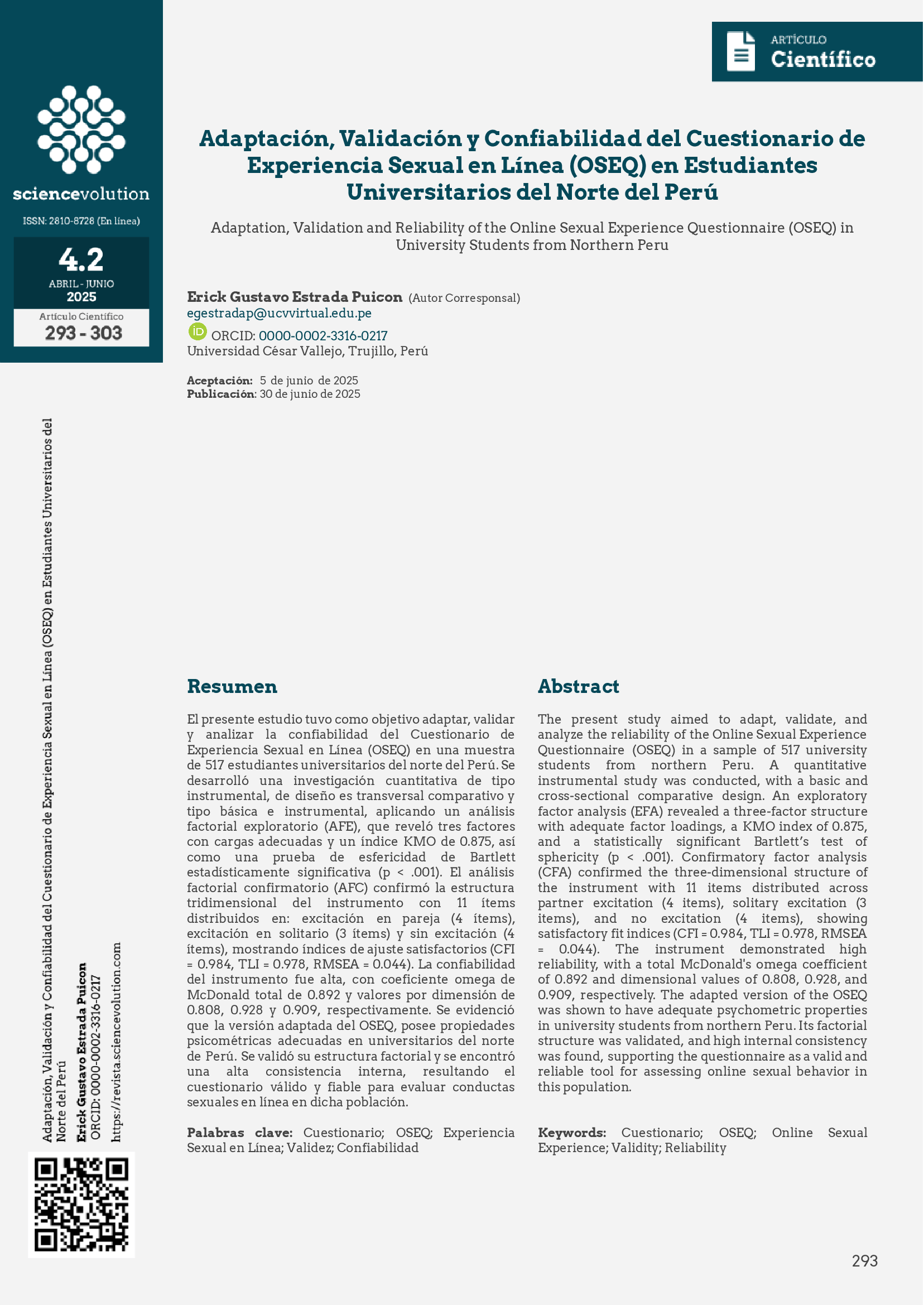Abstract
The present study aimed to adapt, validate, and analyze the reliability of the Online Sexual Experience Questionnaire (OSEQ) in a sample of 517 university students from northern Peru. A quantitative instrumental study was conducted, with a basic and cross-sectional comparative design. An exploratory factor analysis (EFA) revealed a three-factor structure with adequate factor loadings, a KMO index of 0.875, and a statistically significant Bartlett’s test of sphericity (p < .001). Confirmatory factor analysis (CFA) confirmed the three-dimensional structure of the instrument with 11 items distributed across partner excitation (4 items), solitary excitation (3 items), and no excitation (4 items), showing satisfactory fit indices (CFI = 0.984, TLI = 0.978, RMSEA = 0.044). The instrument demonstrated high reliability, with a total McDonald's omega coefficient of 0.892 and dimensional values of 0.808, 0.928, and 0.909, respectively. The adapted version of the OSEQ was shown to have adequate psychometric properties in university students from northern Peru. Its factorial structure was validated, and high internal consistency was found, supporting the questionnaire as a valid and reliable tool for assessing online sexual behavior in this population.
References
Ato, M., & Vallejo Seco, G. (2015). Diseños de investigación en Psicología. Editorial Pirámide.
Ato, M., López-García, J. J., & Benavente, A. (2013). Un sistema de clasificación de los diseños de investigación en psicología. Anales de Psicología / Annals of Psychology, 29(3), 1038–1059. https://doi.org/10.6018/analesps.29.3.178511
CONCYTEC (2020) Guía práctica para la formulación y ejecución de proyectos de investigación y desarrollo experimental (I+D). https://repositorio.concytec.gob.pe/server/api/core/bitstreams/6bde43a4-20e4-24c2-36c5-839528c948ef/content
Cruz-Moreno, A. P., & Vesga-Gualdrón, L. M. . (2024). Validación de un instrumento que mide conductas sexuales de riesgo en línea. Salud UIS, 56. https://doi.org/10.18273/saluduis.56.e:24050
Del Rey, R., Ojeda, M. & Casas, J. A. (2021). Validation of the Sexting Behavior and Motives Questionnaire (SBM-Q). Psicothema, 33(2), 287-295. https://doi.org/10.7334/psicothema2020.207
Guajardo Garcini, D. A., De la Rosa Gómez, A., Mancilla Díaz, J. M., & Serrano Zárate, B. (2023). Validación del cuestionario de experiencia sexual en línea (OSEQ) en estudiantes universitarios mexicanos. Ciencia y Sociedad, 48(1), 33–50. https://doi.org/10.22206/cys.2023.v48i1.pp33-50
Instituto nacional de estadística e informática - INEI (2022) Educación Universitaria.https://m.inei.gob.pe/estadisticas/indice-tematico/university-tuition/
Mohamad, F., Azlan, S., Kamaruddin, K. N., Shibraumalisi, N. A., Dahlan, R., Syed Mohamad, S. N., Ismail, I. Z., Shamsuddin, N. H., & Kadir Shahar, H. (2024, abril). Sexual risk behaviour among Malaysian youth – A nationwide cross-sectional study [Ponencia de conferencia]. Annual Scientific Conference 2024: Primary Care for Each and Everyone, Everly Hotel, Putrajaya. https://www.researchgate.net/publication/384267078_Sexual_Risk_Behaviour_Among_Malaysian_Youth_-_A_Nationwide_Cross-Sectional_Study
Muñoz, G., & Salas Blas, E. (2024). Sensation seeking, Self-esteem and Sexting in University Students of Metropolitan Lima. Revista Digital de Investigación en Docencia Universitaria, 18(2), e1956. https://doi.org/10.19083/ridu.2024.1956
Ríos-Ariza, J. M., Matas-Terron, A., Del Pilar Rumiche Chávarry, R., & Chinguel, G. R. C. (2021). Scale for Measuring Phubbing in Peruvian University Students: adaptation, validation and Results of its application. Journal of New Approaches in Educational Research, 10(2), 175–189. https://doi.org/10.7821/naer.2021.7.606
Rodríguez-Castro, Y., Alonso-Ruido, P., González-Fernández, A., Lameiras-Fernández, M., & Faílde-Garrido, J. M. (2021). Validación de la Escala de Comportamientos de Sexting en Adolescentes: Prevalencia y consecuencias asociadas. Psicología Educativa, 27(2), 177–185. https://doi.org/10.5093/psed2021a9
Rodríguez-Otero, L. M., & Cerros-Rodríguez, E. (2022). El sexting como vía de materialización de la violencia: prácticas y consecuencias en alumnado universitario de Nuevo León y Jalisco. Revista Criminalidad, 63(3), 203-214. https://doi.org/10.47741/17943108.305
Sánchez-Hernández, Y., Crisol-Moya, E., & León-Guerrero, M. J. (2020). Diseño y validación del cuestionario de Conocimientos, Actitudes y Prácticas Sexuales en jóvenes universitarios (CAPSEX) [PDF]. Revista Espacios, 41(39), Artículo 13. https://www.revistaespacios.com/a20v41n39/a20v41n39p13.pdf
Scott, R. H., Smith, C., Formby, E., Hadley, A., Hallgarten, L., Hoyle, A., Marston, C., McKee, A., & Tourountsis, D. (2020). What and how: doing good research with young people, digital intimacies, and relationships and sex education. Sex education, 20(6), 675–691. https://doi.org/10.1080/14681811.2020.1732337
Shaughnessy, K., Byers, S., Clowater, S., & Kalinowski, A. (2013). Self-appraisals of arousal-oriented online sexual activities in university and community samples. Archives of Sexual Behavior, 43(1), 1187–1197. https://doi.org/10.1007/s10508-013-0115-z
Sierra, J. C., Álvarez-Muelas, A., Arcos-Romero, A. I., Cervilla, O., Mangas, P., Muñoz-García, L. E., & Monge-Rodríguez, F. S. (2022). Sexual activity in Peruvian adolescents: Relevance of socio-demographic variables and sexual attitudes. Children, 9(3), 386. https://doi.org/10.3390/children9030386

This work is licensed under a Creative Commons Attribution-NonCommercial-NoDerivatives 4.0 International License.

